By: Julian Blythe April 9, 2017
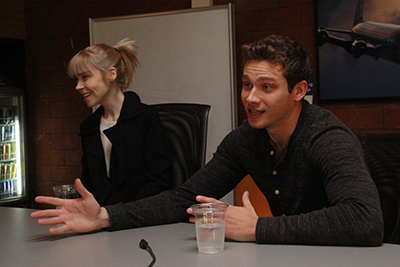
Oliver Stark who is the British actor best known for his role on Badlands on AMC and Northern Irish actress Antonia Campbell-Hughes who is best known for her role in Jack Dee’s Lead Balloon both shed some light on their roles in the film, Mindgamers. Oliver describes his role as actually stepping away from the science of Quantum theory, as Antonia describes her research into the subject. They also talk about the possibilities of the future and hacking the human mind.
Before our interviews we were outfitted with the same technology that Mindgamers used for their premiere. It was a couple of electrodes that were attached to my forehead, and one behind the neck. A USB cable attached to the device ran down into the tablet I was holding. While fiddling around with the application they were using, I stumbled upon my user ID. They displayed to us visualizations of brain activity from everyone plugged in each with a user ID attached to the corresponding information. After checking to see everyone was plugged in, they showed us a sneak peak of Mindgamers. The experience of watching the movie while being surveyed was only present on my mind, but as the screening wore on I forgot it was there.
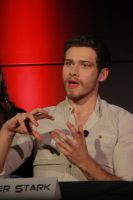 Q: So what is it like to be part of something so new and exciting?
Q: So what is it like to be part of something so new and exciting?
Oliver Stark: It’s taken on many different forms over that whole process. It’s exciting, I think to be a part of something that’s never really been done before.
Antonia Campbell-Hughes: I suppose from the get go, Joanne Reay (writer, producer) and Andrew (Goth, director) were very invested in the science element, and I think when we all came on board, that was on the table from the beginning. It’s really good, something that feels vital or important. It has a message.
OS: It could be used for something that is genuinely going to be a benefit and a service to the neuroscience community. It will be nice to look back and say, “Yeah we were a part of that.”
AH: Yes, it’s not just entertainment. (It’s) so much of what we do, the way that people interact with each other, (because) the world is shrinking basically. Everyone is much more in contact. Science and healthcare is very progressive.
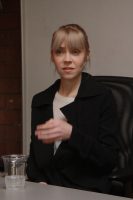 Q: What sort of research did you undertake to play your characters Dylan (played by Oliver) and Agnes (played by Antonia)? Where did it start with the research?
Q: What sort of research did you undertake to play your characters Dylan (played by Oliver) and Agnes (played by Antonia)? Where did it start with the research?
AH: [Laughs] Well, we were all initially sent a lot of quantum theory information that covered… It was a foundation for all of the characters, which is the experiment that you see Kreutz (played by Sam Neill) doing, the brain. We saw a TED talk, and then each character has a different area of expertise. I know that mine was quite interested in the concept of immortality, and that’s basically what Agnes is looking at; a dual existence. I did do a lot of reading into that and also where spirituality has a place in people’s lives. People aren’t just fired up into religions but also spiritual beliefs and it spans from as far as what people do about mindfulness and that was something I (found interesting) as a science.
OS: I didn’t really want to give too much of my attention to the quantum scientific part, because it wasn’t really necessary all that important to my character. I had a foundation and understanding of it, but that was not going to inform any of my choices actually playing the part. As Antonia said, each character has their own thing, and for me, Dylan, he was very musical and he’s very driven by trying to bring emotions and discover emotions that people don’t have access to. I wanted to look more into that, than the specific quantum theories that I didn’t really need to know. Everybody had different ways into each character. For me, it was once we started seeing costume, and I don’t know how much of the movie you’ve seen, but I look quite different in it. I was able to get into those clothes, into those shoes, and have that hairstyle that all sort of fit together a little easier.
Q: How would you feel if someone could achieve something that’s taken you years to accomplish using this theoretical technology?
OS: As if somebody could download your…
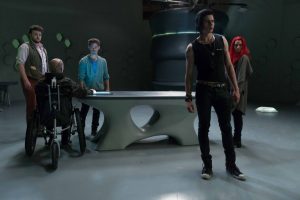 Q: If someone could download your acting skills.
Q: If someone could download your acting skills.
OS: Yeah, good. Surely that means then that I could do the same to somebody else. You mean, if I put in the hard work and somebody can have it like that? Freedom of…
AH: Plagiarism [laughs].
OS: I would sue. I think being able to share abilities would be incredible. Because, as you say yes somebody can take what you’ve worked on, but you’re able to further your own abilities.
Q: Would that take off some of the competition?
OS: Yes, and I don’t know. We’d have to find other ways to motivate ourselves. What it would lose is a sense of achievement. If you never have to work to do anything then once you can do it, do you care as much?
AH: Yeah, what’s interesting in the film is that basically these characters are students they excel, they’re competitive and are driven. It is a kind of educational environment that they’re in and there is a drive for them to all compete with one another. I thought that was quite interesting about how they all seem to be somewhat about themselves. Each character embodies the particular science that they are into.
OS: Everybody is a group, but they all want to use it to get ahead.
AH: I guess that’s something that’s an epidemic in some of these third level education systems. They’re overly…
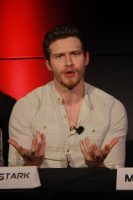 Q: So ideally the whole purpose of hacking the human mind in this film is for what? What is the ultimate goal?
Q: So ideally the whole purpose of hacking the human mind in this film is for what? What is the ultimate goal?
AH: Well drive is the drug isn’t it?
OS: Well yeah, but the motivation for them is that everyone is that everybody should have access to the top level smarts and physical ability. There’s a scene in the movie where there’s the whole shooting community there and it’s not going on necessarily that way and they hate that. They want it to be readily available to everyone. I think it comes from a positive point, but I think they want to say, “I did this for everyone.” I’m the one that gave this gift to you, but it comes from a good place.
AH: What they basically look at is that hunger for power. It starts to go into a kind of negative arena that happens to these people.
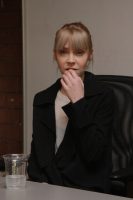 Q: Are they looking for fame or something else?
Q: Are they looking for fame or something else?
AH: No, I think they’re truly driven.
OS: I don’t know if it’s fame.
AH: It’s a thirst for knowledge, isn’t it?
OS: Yeah, but from each character, they have slightly different motivations.
AH: Agendas.
OS: Each of them is definitely more in it for themselves than others are.
AH: That’s the thing isn’t it? We’re all encouraged to focus on our own characters, and our own truths. I think that’s what we do naturally anyways. Agnes’s whole thing is that it’s innate. Her knowledge is innate. I always thought her motivation was slightly more pure, but maybe I chose to see it that way since she’s my character.
OS: She’s wonderful, but there’s also the thing (where) greed can further an economy or nation if everybody is out for themselves… There’s quite a specific theory on it called, “The Invisible Hand.” It’s about greed leading to everyone prospering. I think regardless of their motivation for getting into it. If the outcome works for everyone, then that’s the important thing, but (only) if it works for everyone.
Q: Where does the story lead the audience? What’s the punch line?
OS: I think it asks questions of what you would do in certain situations and how you would feel about this free share of information. If you would use it for yourself or I suppose, a greater good. Also to ask questions of the audience and make them reflect on their own values which we all seem to do.
 Q: As far as tone goes Oliver, Mindgamers has a very dark tone underlying it. It puts a negative light over this human consciousness/unconsciousness. What did you think about this possible future, is it as bleak as this movie paints it to be?
Q: As far as tone goes Oliver, Mindgamers has a very dark tone underlying it. It puts a negative light over this human consciousness/unconsciousness. What did you think about this possible future, is it as bleak as this movie paints it to be?
OS: For me the most positive thing that comes out of the movie is groundbreaking science. It comes about from a group of 5 different characters (who are) male, female, and different sexualities, backgrounds, cultures, (and/or) skill sets. It’s all about that coming together and using what each other have which forwards the story. The positive outcome for me is that everybody’s differences make them stronger, and that an important thing for audiences to see.
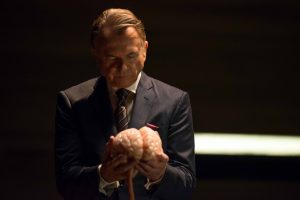 Q: If you could choose anybody’s brain to draw from, living or dead, who would you chose?
Q: If you could choose anybody’s brain to draw from, living or dead, who would you chose?
OS: [Laughs]
AH: Anyone in the world?
OS: Anyone’s brain? Can I take different aspects of different human (minds)? I think I would have the patience of Nelson Mandela, and the intelligence of Einstein.
AH: To be able to play like Bach?
OS: Yeah why not, the musical gifts of someone? Yeah, I would go with the patience of (Mandela) and the smarts of Einstein.
AH: I’m just always inspired by writers and how their minds work. I’d quite like to tap into early groundbreaking feminists.
Mindgamers is currently playing in select theatres nationwide. For theatre locations and ticket info, visit the film’s official website at http://www.mindgamersmovie.com/#/
Interview by: Julian Blythe
Edited by: Jody Taylor – @RealJodyTaylor
Follow Us: What’s Up Hollywood at @WhatsUpHWood
